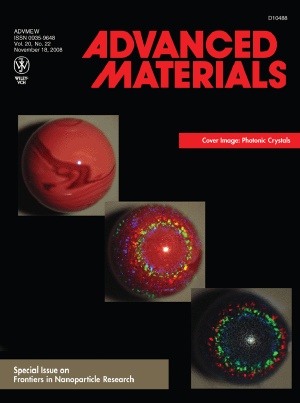Dec 4 2008
The cover story of a recent special edition of the science and engineering journal Advanced Materials features research by Antonio Garcia, professor in the Harrington Department of Bioengineering and director of the Laboratory for Personalized Molecule Measurement, and Manuel Marquez, an adjunct faculty member in the department.
 A special edition of Advanced Materials magazine on "Frontiers in Nanoparticle Research" featured work by ASU bioengineering faculty.
A special edition of Advanced Materials magazine on "Frontiers in Nanoparticle Research" featured work by ASU bioengineering faculty.
The cover shows optical microscopy images of drying droplets from aqueous suspensions of monodisperse latex or latex/gold nanoparticle mixtures dispensed on superhydrophobic substrates.
The article reports on the synthesis of light-diffracting assemblies obtained from microspheres and nanoparticles in droplets on a superhydrophobic surface.
Colloidal crystals are formed in the surface layer of the droplets due to the flux of evaporating water. The colloidal crystals give rise to multicolored diffraction patterns upon illumination with collimated white light. Once completely dried, these templates yield structured nanojewel supraparticles.
As more nanoparticles and nanostructures come into the marketplace, technologies that can quickly assemble the structures so that their unique size and properties can be employed in new devices will be important to the growth of nanotechnology and industries using nanomaterials, especially optical technologies.
To read more, see http://www.fulton.asu.edu/fulton/news/page.php?sid=550.